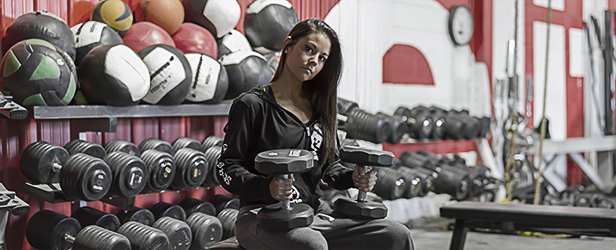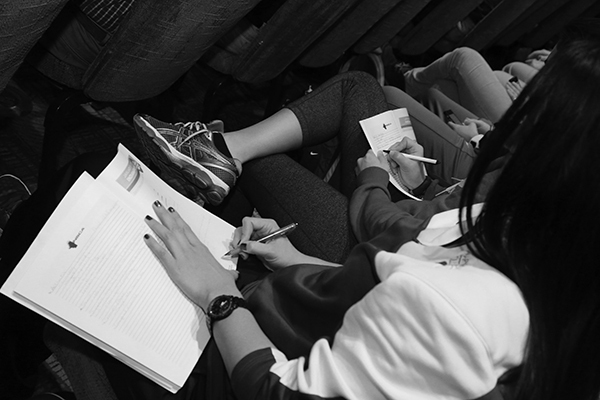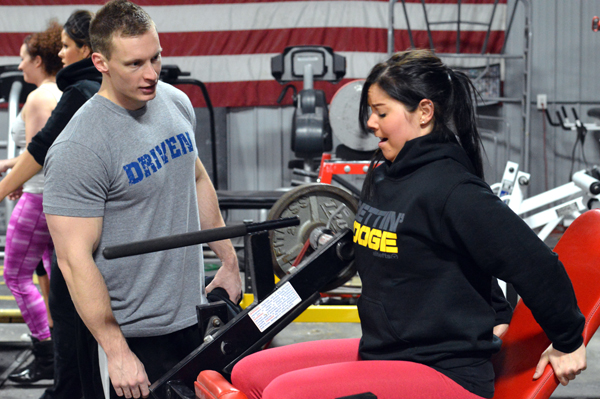
I recently took the newest version of the NSCA Certified Strength and Conditioning Specialist exam this past August. Just like the industry and the knowledge in it, the test is regularly modified and updated to be as current as possible. The test can sometimes be intimidating, so I want to share some tips and strategies I recommend to others planning to take the test. I have an academic background in exercise physiology but also some coaching and personal training experience. In my opinion, having experience coaching made a huge difference in my testing capability.
How a person studies and prepares for this test depends highly on where they have come from and their experiences academically and/or in a coaching setting. The test is split up into two parts, a scientific section (exercise physiology and nutrition) and a practical portion (movement analysis, cuing, and program design). From my conversations with others who took this test as well, those who are newly graduated from a kinesiology or exercise physiology program rock the scientific section, but have a hard time on the practical section. Whereas coaches, trainers, and lifters find the scientific aspect to be mind-blowingly difficult, and the practical portion to be a breeze. If you know your strengths and weaknesses going into the exam, you'll know how to study and pass the test.
Here are some specific pieces of advice to remember while preparing to take the exam:
Study Strategically
Think about your strengths and your weaknesses in terms of your overall exercise physiology and practical knowledge. For most post-graduates straight out of school, practical knowledge will absolutely be their weak point. For the most part, their faces have been stuffed in a book for years rather than moving weight or programming training cycles for athletes. You have to remember the exercise physiology portion of the test is just that: a portion. Without practical knowledge of training you will most definitely fail. For students looking to take their CSCS upon graduation, I highly recommend the following:
- Buy the book. May seem like I am stating the obvious but I know how college students hate to buy books. This one is a must.
- Obtain an internship with a team or strength and conditioning facility.
- Focus on studying training you are not familiar with, which probably means speed and agility for most students. Playing high school football doesn’t qualify you as an expert in speed drills.
- Train.
Observing the movements during a training session is one thing, but performing the exercises yourself will give a much better perspective. When I interned at a strength and conditioning facility throughout my undergraduate studies, I was lucky enough to have a mentor that made me do almost every workout with the athletes. Some days I would help cue and coach, but for the most part I was busting it with the team. It personally helped me experience what certain movements and lifts actually felt like, and I was also able to pick out weaknesses I needed to work on myself. Doing is almost always better than only observing.
For those of you who have been in the field day in and day out training clients or athletes, the practical knowledge will be the easy part. Going back and reviewing the deep exercise physiology concepts will probably be a wise choice. I've found that even though I am only three years out from having finished my Master’s degree in Exercise Physiology, the information I haven’t used or thought of every day quickly disappeared. I currently spend most of my days correcting form and focusing on mechanics within the scope of my job. I don’t watch someone squatting thinking about the sodium potassium pump action going on in their muscle fibers. Focus your studying on what you don’t know or may not remember from years past. If you feel you may be in this boat, I would suggest the following:
- Buy the book. Yes you may have been a coach for years and know it all, but that doesn’t matter if you don’t know what they are looking for from an exercise physiology standpoint.
- Review the exercise physiology in detail again. The questions will be very specific.
- Read the book backwards. Start with the last chapter and end with the first. That way, you start your studying with the practical info you can probably breeze through, and save the exercise physiology for the end so it is fresh in your memory for the exam. I personally did this and I think it helped.
Throw Your Training and Nutrition Out the Window
While studying for the test, I found that my own personal training and philosophy was actually hindering me. Anyone who trains or competes can attest that over time they develop a training philosophy they believe in for one reason or another, and soon everything they do or think revolves around that philosophy. Well, be prepared to agree and disagree numerous times with the NSCA recommendations and program design viewpoint. Remember, you are going to take a test designed around training sport specific athletes, not necessarily powerlifters, bodybuilders, or strongman competitors. You need to understand the NSCA’s priorities in training and what they expect out of you as a coach. For testing purposes it is their way or the highway, so pay attention to their nomenclature and areas of emphasis. I found this more relevant when it came to the nutrition questions within the test. Especially since I compete in various strength/esthetic sports, my opinions and beliefs about nutrition and what is actually necessary for performance are very different than most. I had to underestimate athletes’ protein intake and overestimate carbs and fats. And yes, they will expect you to know how much a certain athlete should be consuming based on their current status and their goals. Everyone always seems to brush off nutrition when it comes to these types of certifications, but I suggest you review the chapter at least to gain an understanding of their standards. There were many more nutrition based questions than I would have expected. To summarize this point I would focus on the following:
- Remember the focus population of the CSCS certification and focus your program design and nutrition accordingly.
- Review the program design chapter and make sure you understand the concepts and reasoning behind the programming. Don’t just memorize words.
- At least skim the nutrition chapter. It doesn’t matter if you agree with it or not; you just have to know it.
Some Final Thoughts
Don’t assume you are ready to jump into this test if you've trained yourself or have a decent clientele. Even if you have a different certification or degree, don't assume you're prepared for the CSCS. It was not a fun test to take and was very challenging. I personally scheduled my test 12 weeks out from my test date (I feel like I am meet prepping when I say that) which essentially gave me time to study two chapters a week. Did that happen? Hell no. Life happened and my full time job changed, which allowed very little time to study. I just had to make it work, so I focused on what I didn’t know or remember. I probably studied a handful of times for a 4-6 week period. Again, I would definitely recommend getting the book, and at least take a gander from time to time. Reading the book in its entirety may not be necessary for some but it definitely wouldn’t hurt. Paying to take the test over again would hurt a lot worse. I definitely recommend trying to plan out your studying but be prepared to haul ass if life smacks you in the face. You can reschedule your test if you don’t think you will be prepared but there is a fee to do so. No thanks — just get it done and over with.
The CSCS certification by no means officially makes you a strength coach, but it's a good place to start. The certification may get you in the door for an interview. From there, you have to actually know what you are doing to keep your job. You have to practice what you preach and live it out every day. Anyone can sit behind a computer screen and regurgitate what they memorized from a book; a real coach will take what they learned and apply it to make an athlete excel. If you pass the CSCS exam, I urge you not to stop there. Continue to learn and grow, as the field is always changing. Also, you don’t have to necessarily be a coach or strive to be in the coaching field for the CSCS credentials to be appropriate for you. I personally got my CSCS to continue my education and learn more about the field because it applies to my job but isn’t a necessity. The test shouldn’t be the end; it should be the beginning. The beginning of humbling yourself enough to learn new things every day and educate the athletes or clients you work with. As long as you take your study time seriously and gain an understanding of what the NSCA expects from you, you should be a-okay. Good luck, and may the iron be with you!











Sound advice, and from what I understand a tough test, but definitely the gold standard if you want to be a strength coach. You may be awesome at getting your client to new heights, but if you don't have the CSCS, no serious competitor is going to hire you. Congratulations.
Question. How do you recommend one reconcile his bias about nutrition when it doesn't match the guidelines of his certification? Would you recommend leading with something like "My certification guidelines recommend ____, but I've found ____?" Or just say what you believe?
Thanks.
Good question. I personally think the CSCS is a "must have" for strength coaches at any level, and a "gold star" for personal trainers and gym owners. It puts credibility behind your name, but even more so it allows for more networking opportunities and continuing education. This year I will be attending the NSCA National Conference...and I wouldn't think to go to that conference if I didn't have my credentials. You may not need to get it right away, but I do think it has value to eventually get in the long run.
Hope that helps!
- Alycia
I started putting together a guide again to rehearse the knowledge as I apply it. I'm sure there are better ones out there but, if anyone wants to read it it's starting from chapter 1 at:
http://www.simplesolutionsfitness.com/cscs-study-guide-chapter-1-structure-and-function-of-body-systems
I would say, since half the test is purely exercise physiology to definitely know it well. I would reach the chapters in full if needed. It does go pretty in depth especially with energy systems and muscle contraction phys. So definitely hit that hard.
The massive roadblock that I am having is the physics formulas found in chapter two. Specifically, work/force/time, positive/negative work and anything mathematical. I also have dyscalculia, or a disability in learning math, understanding numbers, or just understanding equations. If I can understand this part, I will do a great job on the test. It’s this part that is holding me back.